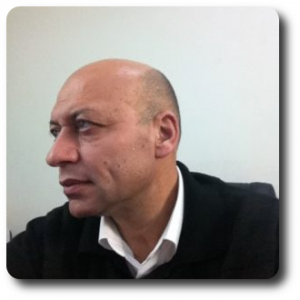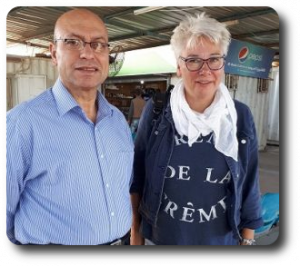By Michaela Fried with commentary by Peter Jakob.
My friend and colleague Ahmed died two days ago, torn from the middle of his life, out of the middle of his family in Gaza. With the event of an invitation to deliver a keynote speech in May, by our friends and colleagues in Israel, I had asked him to write a brief bio, no longer that 100 Words, and I asked him whether that was even possible, given his rich and varied life. Ahmed smiled and replied in that modest manner of his that it would not be difficult to do that – there wasn’t that much to say about him anyway:
 “Ahmed Abu-Tawahina is a clinical psychologist and human rights and peace activist. Past Director (1995- 2014) of Gaza Community Mental Health Program, and currently Chairman of Mental Health Promotion and Capacity Building Center. Publishes extensively on issues of peace, civil society, human rights and mental health.
“Ahmed Abu-Tawahina is a clinical psychologist and human rights and peace activist. Past Director (1995- 2014) of Gaza Community Mental Health Program, and currently Chairman of Mental Health Promotion and Capacity Building Center. Publishes extensively on issues of peace, civil society, human rights and mental health.
This technical expertise comes from 25 years of practice experience as well as continuing advanced studies. He received external clinical supervision in psychotherapy and practice with children and families from international experts and participated in numerous training courses. Dr Abu Tawahina has received his PhD in psychology from Cairo University and published over 30 papers in peer reviewed journals.”
Unlike the many refugees there, Ahmed was born in Gaza. His father owned and farmed land. Ahmed would enthuse about the olives and oranges his father grew, and about his very deep love for his parents and siblings. Ahmed studied in Cairo, and then worked in Europe, the United States and with colleagues in Israel. Before Gaza turned into a prison, he’d had the opportunity to establish himself in Europe, but his roots brought him back to his homeland.
I got to know him through my Israeli friend and colleague Dan Dolberger and visited him for the first time in 2015, one year after the last war, operation ‘protected edge’. In Ahmed’s house, I had the opportunity to share in his family’s life, along with all aspects of living in Gaza: the trembling of the walls when 20 km away the South of Gaza was under fire, water shortages, showering or reading by the light of a torch – but also the unbelievable hospitality, warmth and love his family showed me. For Ahmed and his wife, there was no question that I would have the master bedroom, while the couple shared their children’s rooms.
Once a day, Ahmed took his main meal with me; we sat opposite each other at the large table, at which his wife helped their children do their homework, learn their English words, and where I took notes of our sessions with patients. His eyes would shine when he told me about the lovely meals his wife and daughters had prepared, typical local fare, lovingly prepared and tastefully served. I was always spoiled and treated as a guest; guests are royalty in Islamic tradition – and that is how I was made to feel. Only rarely was I allowed to eat in the kitchen with the others; just once sitting on the floor, using the hands Allah had given me to put His food into my mouth – and to everyone’s amusement I needed a lot of help and a spread of towels around me to manage eating in that way.
Confronted with the fate our young clients and their families were enduring, I soon recognised that, even though belonging to the educated middle class, Ahmed’s family lived like any other family in Gaza, trying to survive.We laughed a lot, especially amongst us women, but also Ahmed and I felt connected by moments of hilarity which arose alongside the indescribable suffering and privation that belong to life in Gaza – e.g. when we shared our self-deprecating humour about our inability to understand the ‘new’ media such as computer programmes or smartphones as we spent entire evenings attempting to fill in funding applications. I believe that my humour was also soothing for Ahmed.
 I never heard him complain or require anything for himself. When asked what I could bring from Europe that would make him happy, he would request an ointment, or this or that medicine for someone in the family, but said that my visit, my presence was the best gift. When I would see Ahmed sitting in his living room wearing a hood and coat, freezing, when we were speaking to each other on Skype in winter and I asked him how he was, he only replied “we adjust, we are used to living in deprived circumstances”, and quickly changed the subject to distress of his clients.
I never heard him complain or require anything for himself. When asked what I could bring from Europe that would make him happy, he would request an ointment, or this or that medicine for someone in the family, but said that my visit, my presence was the best gift. When I would see Ahmed sitting in his living room wearing a hood and coat, freezing, when we were speaking to each other on Skype in winter and I asked him how he was, he only replied “we adjust, we are used to living in deprived circumstances”, and quickly changed the subject to distress of his clients.
Ahmed understood his impact; he was known in Gaza, a person who was listened to, respected – not only at home. He himself had nothing to lose, he said once, that is why he could forgo violence and embody an attitude of nonviolence in the way he lived. He did not shy away from naming violence and humiliation, whether instigated by the state of Israel or the Hamas regime.
At the same time, he sought to unearth the often-buried longing for peace and the desire for dignity in each person, in the same way that one would seek to find life under rubble after an ‘operation’. Ahmed believed in reconciliation, yet he felt that dialogue was a prerequisite for reconciliation; he believed that listening to one another, witnessing and acknowledging the suffering that each had caused the other, are a necessity. The obligation he felt to pursue reconciliation grew from his deep faith. This obligation manifested itself in his prolific research activity, his engagement with and activism for numerous NGOs, such as his most recent activity in ‘Dignity’, but it also showed itself on a smaller scale, in the many consultations he gave to people who sought his help and advice.
Ahmed saw not only the spread of blindness in the wake of retaliation {the law of ‘an eye for an eye’} but was also acutely aware of the paralysis that trauma caused in people. At the same time, he felt that the ongoing traumatisation of Gazans renders traditional psychological treatment for trauma ineffective. For this reason, he was fascinated by ‘Non-Violent Resistance (NVR)’ which was developed by Haim Omer in Israel, a psychological approach he saw as very promising and introduced under the name of ‘New Family Authority’ in Gaza.
I witnessed Ahmed’s outrage when he told me about violent altercations that had caused injuries and deaths, or about senseless suicides, or acts of revenge. The increasingly diminished aid, poverty and lack of employment in his homeland made him feel helpless, as did European and American ‘looking away’. “Tell people about us Michaela, so that our lives and deaths have meaning” Ahmed and many of his compatriots said emphatically. The existential economic disaster that renders life near impossible, the poor nutrition and lack of medical care, and the deaths of so many tired Ahmed out and finally broke his heart.
He was laid to rest in his homeland, but we will follow his example and carry on; we need every bit of support, more than ever.
For me, Ahmed is the ‘Gandhi of Gaza’.
Michaela Fried.
————————————————————————————————————————————————————————————–
I only knew Ahmed from our conversations on Skype. He had been invited to present at the international NVR conference 2016 in Malmoe, Sweden, but in spite of all our attempts, Ahmed was not granted a transit visa by the Jordanian authorities, so we could not meet in person. I knew how much affection, respect and admiration my friends and colleagues Michaela Fried and Dan Dolberger felt for him, and was taken aback by his sustained engagement for peace and reconciliation, both in the political sphere, but importantly also within families and communities in Gaza.
“How can you support and organisation like Bridges for Hope and Peace“, I was asked by an internet troll – the NGO which was founded by Michaela Fried, Martin Fellacher and others, the aim of which is to support nonviolence and NVR in Gaza, especially in schools which are UN funded – and now at risk because of Donald Trump’s threat of removing funding to Gaza. In these schools, in the community, and in families, Ahmed and Michaela have sought to create islands of nonviolence and recovery from trauma. Ahmed has been the bridgehead, the centre of this effort, together with Michaela. My answer to the troll’s question is to read the obituary Michaela wrote for Ahmed. I am awed by the courage to pursue NVR, to take a nonviolent position, in the face of aggression and deprivation all around. If ever the nonviolent virtue of perseverance has found its most sincere expression, it is in the work begun by Ahmed and Michaela, and which she has pledged to continue.
Please support B4HP –Bridges for Hope and Peace, in commemoration of Ahmed’s life.
Peter Jakob
